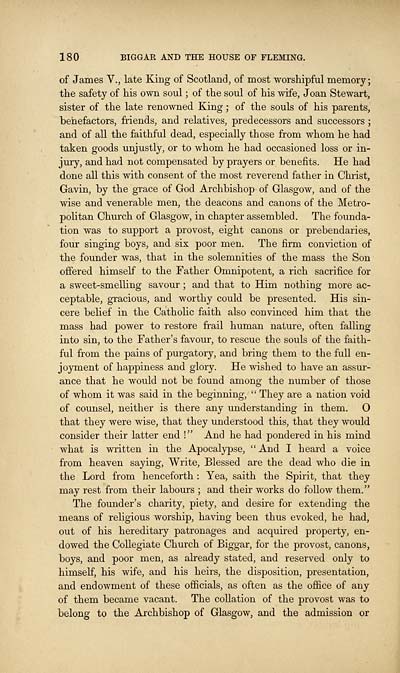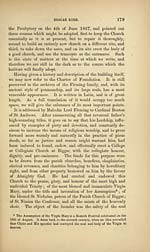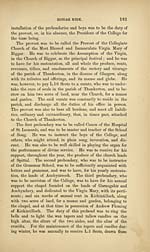Biggar and the House of Fleming
(208) Page 190
Download files
Complete book:
Individual page:
Thumbnail gallery: Grid view | List view

180 BIGGAR AND THE HOUSE OF FLEMING.
of James V., late King of Scotland, of most worshipful memory;
the safety of his own soul ; of the soul of his wife, Joan Stewart,
sister of the late renowned King ; of the souls of his parents,
benefactors, friends, and relatives, predecessors and successors ;
and of all the faithful dead, especially those from whom he had
taken goods unjustly, or to whom he had occasioned loss or in-
jury, and had not compensated by prayers or benefits. He had
done all this with consent of the most reverend father in Christ,
Gavin, by the grace of God Archbishop of Glasgow, and of the
wise and venerable men, the deacons and canons of the Metro-
politan Church of Glasgow, in chapter assembled. The founda-
tion was to support a provost, eight canons or prebendaries,
four singing boys, and six poor men. The firm conviction of
the founder was, that in the solemnities of the mass the Son
offered himself to the Father Omnipotent, a rich sacrifice for
a sweet-smelling savour ; and that to Him nothing more ac-
ceptable, gracious, and worthy could be presented. His sin-
cere belief in the Catholic faith also convinced him that the
mass had power to restore frail human nature, often falling
into sin, to the Father's favour, to rescue the souls of the faith-
ful from the pains of purgatory, and bring them to the full en-
joyment of happiness and glory. He wished to have an assur-
ance that he would not be found among the number of those
of whom it was said in the beginning, " They are a nation void
of counsel, neither is there any understanding in them.
that they were wise, that they understood this, that they would
consider their latter end !" And he had pondered in his mind
what is written in the Apocalypse, "And I heard a voice
from heaven saying, Write, Blessed are the dead who die in
the Lord from henceforth : Yea, saith the Spirit, that they
may rest from their labours ; and their works do follow them."
The founder's charity, piety, and desire for extending the
means of religious worship, having been thus evoked, he had,
out of his hereditary patronages and acquired property, en-
dowed the Collegiate Church of Biggar, for the provost, canons,
boys, and poor men, as already stated, and reserved only to
himself, his wife, and his heirs, the disposition, presentation,
and endowment of these officials, as often as the office of any
of them became vacant. The collation of the provost was to
belong to the Archbishop of Glasgow, and the admission or
of James V., late King of Scotland, of most worshipful memory;
the safety of his own soul ; of the soul of his wife, Joan Stewart,
sister of the late renowned King ; of the souls of his parents,
benefactors, friends, and relatives, predecessors and successors ;
and of all the faithful dead, especially those from whom he had
taken goods unjustly, or to whom he had occasioned loss or in-
jury, and had not compensated by prayers or benefits. He had
done all this with consent of the most reverend father in Christ,
Gavin, by the grace of God Archbishop of Glasgow, and of the
wise and venerable men, the deacons and canons of the Metro-
politan Church of Glasgow, in chapter assembled. The founda-
tion was to support a provost, eight canons or prebendaries,
four singing boys, and six poor men. The firm conviction of
the founder was, that in the solemnities of the mass the Son
offered himself to the Father Omnipotent, a rich sacrifice for
a sweet-smelling savour ; and that to Him nothing more ac-
ceptable, gracious, and worthy could be presented. His sin-
cere belief in the Catholic faith also convinced him that the
mass had power to restore frail human nature, often falling
into sin, to the Father's favour, to rescue the souls of the faith-
ful from the pains of purgatory, and bring them to the full en-
joyment of happiness and glory. He wished to have an assur-
ance that he would not be found among the number of those
of whom it was said in the beginning, " They are a nation void
of counsel, neither is there any understanding in them.
that they were wise, that they understood this, that they would
consider their latter end !" And he had pondered in his mind
what is written in the Apocalypse, "And I heard a voice
from heaven saying, Write, Blessed are the dead who die in
the Lord from henceforth : Yea, saith the Spirit, that they
may rest from their labours ; and their works do follow them."
The founder's charity, piety, and desire for extending the
means of religious worship, having been thus evoked, he had,
out of his hereditary patronages and acquired property, en-
dowed the Collegiate Church of Biggar, for the provost, canons,
boys, and poor men, as already stated, and reserved only to
himself, his wife, and his heirs, the disposition, presentation,
and endowment of these officials, as often as the office of any
of them became vacant. The collation of the provost was to
belong to the Archbishop of Glasgow, and the admission or
Set display mode to:
![]() Universal Viewer |
Universal Viewer | ![]() Mirador |
Large image | Transcription
Mirador |
Large image | Transcription
Images and transcriptions on this page, including medium image downloads, may be used under the Creative Commons Attribution 4.0 International Licence unless otherwise stated. ![]()
| Histories of Scottish families > Biggar and the House of Fleming > (208) Page 190 |
|---|
| Permanent URL | https://digital.nls.uk/94841778 |
|---|
| Description | A selection of almost 400 printed items relating to the history of Scottish families, mostly dating from the 19th and early 20th centuries. Includes memoirs, genealogies and clan histories, with a few produced by emigrant families. The earliest family history goes back to AD 916. |
|---|

